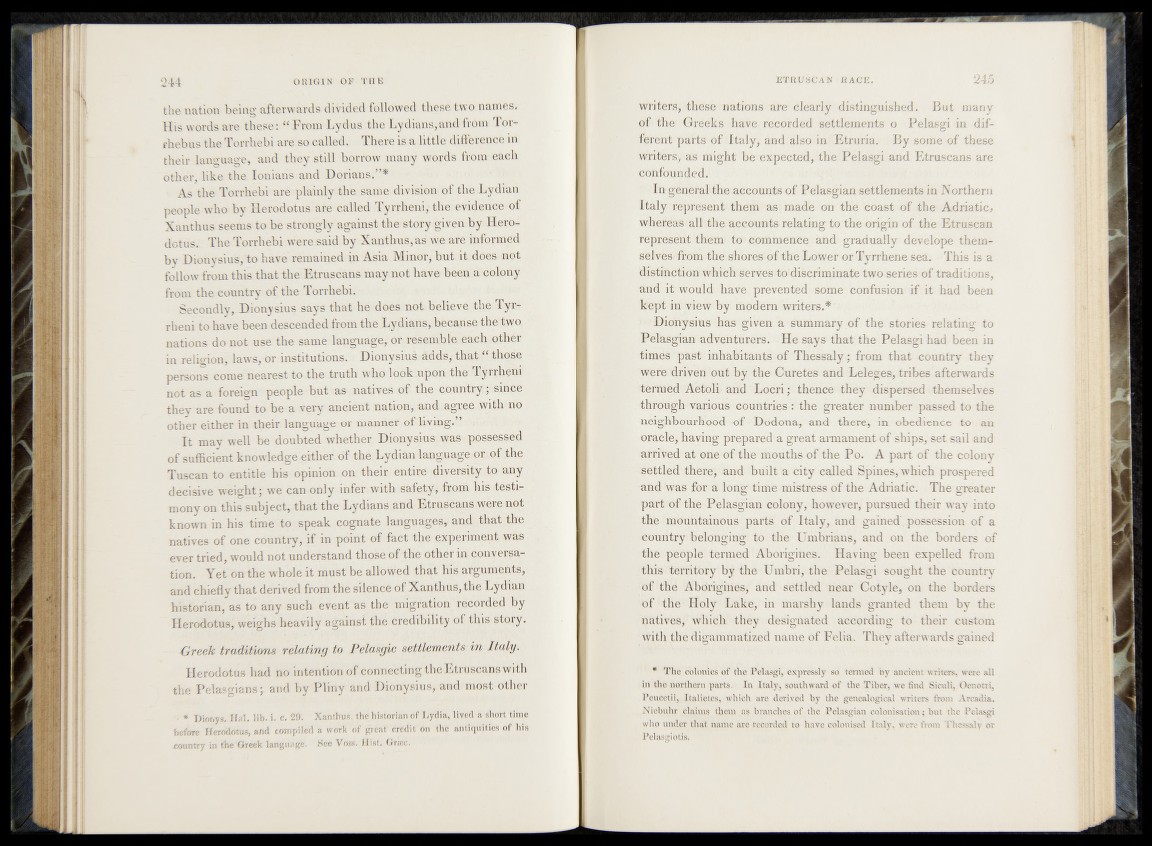
the nation being afterwards divided followed these two names.
His words are these: “ From Lydus the Lydians,and from Tor-
rhebus the Torrhebi are so called. There is a little difference in
their language, and they still borrow many words from each
other, like the Ionians and Dorians.”*
As the Torrhebi are plainly the same division of the Lydian
people who by Herodotus are called Tyrrheni, the evidence of
Xanthus seems to be strongly against the story given by Herodotus.
The Torrhebi were said by Xanthus, as we are informed
by Dionysius, to have remained in Asia Minor, but it does-not
follow from this that the Etruscans may not have been a colony
from the country of the Torrhebi.
Secondly, Dionysius says that he does not believe the Tyrrheni
to have been descended from the Lydians, because the two
nations do not use the same language, or resemble each other
in religion, laws, or institutions. Dionysius'*adds, that “ those
persons come nearest to the truth who look upon the Tyrrheni
not as a foreign people but as natives of the country; since
they are found to be a very ancient nation, and.agree yyithmo
other either in their language or manner of living.” , h t
I t may well be doubted whether Dionysius: was ■pjssesged
of sufficient knowledge either of the Lydian language or of the
Tuscan to entitle his opinion on their entire diversity to any
decisive weight; we can only infer with safety; from his-testi-
mony on this subject, that the Lydians and Etruscans were not
known in his time to speak cognate languages,, and that the
natives of one country, if in point of fact the experiment was
ever tried, would not understand those.of the other in conversation.
Yet on the whole it must be allowed that his arguments,
and chiefly that derived from the silence of Xanthus, the Lydian
historian, as to any such event as the migration recorded by
Herodotus, weighs heavily against the credibility of this story.
Greek traditions relating to Pelasgic settlements in Italy.
Herodotus had no intention of connecting the Etruscans with
the Pelasgi ans; and by Pliny and Dionysius, and most other
* Dionys. Hal. lib. i. c. 29. Xanthus, the historian of Lydia, lived a short time
before Herodotus, and compiled a work of great credit on the antiquities of his
.country in the Greek language. See Voss. Hist. Grrec,
writers, these nations are clearly distinguished. But many
of the Greeks have recorded settlements o Pelasgi in different
parts of Italy, and also in Etruria. By some of these
writers, as might be expected, the Pelasgi and Etruscans are
confounded.
In general the accounts of Pelasgian settlements in Northern
Italy represent them as made on the coast of the Adriatic,
whereas all the accounts relating to the origin of the Etruscan
represent them to commence and gradually develope themselves
from the shores of the Lower or Tyrrhene sea. This is a
distinction which serves to discriminate two series of traditions,
and it would have prevented some confusion if it had been
kept in view by modem writers.*
- Dionysius has given a summary of the stories relating to
Pelasgian adventurers. He says that the Pelasgi had been in
times past- inhabitants of Thessaly; from that country they
were driven out by the Curetes and Leleges, tribes afterwards
termed Aetoli and Locri; thence they dispersed themselves
through various countries : the greater number passed to the
neighbourhood of Dodona, and there, in obedienee to an
oracle, haying prepared a great armament of ships, set sail and
arrived at one of the mouths of the Po. A part of the colony-
settled there, and built a city called Spines, which prospered
and was for a loner time mistress of the Adriatic.O The <a3rea,ter
part of the Pelasgian colony, however, pursued their way into
the mountainous parts of Italy, and gained’, possession of a
country belonging to the Umbrians, and on the borders of
the people termed Aborigines. Having been expelled from
this territory by the Umbri, the Pelasgi sought the country
of the Aborigines, and settled near Cotyle, on the borders
of the Holy Lake, in marshy lands granted them by the,
natives, which they designated according to their custom
with the dig a m m atize d name of Felia. They afterwards gained
* The colonies of the Pelasgi, expressly so termed by ancient writers, were all
in the northern parts. In Italy, southward of the Tiber, we find Sieuli, Oenotri,
Peucetii, Italietes, which are derived by the genealogical writers from Arcadia.
Niebuhr claims them as branches of the Pelasgian colonisation; but the Pelasgi
who under that name are recorded to have colonised Italy, were from Thessaly or
Pelasgiotis.